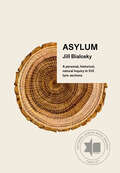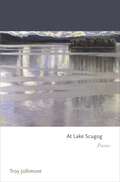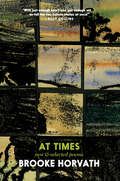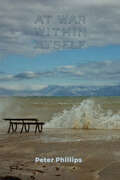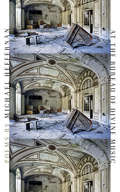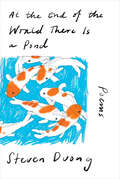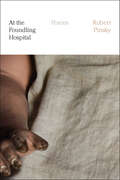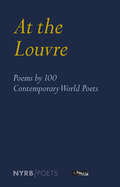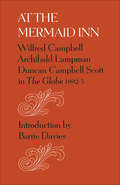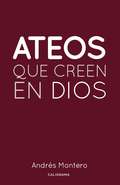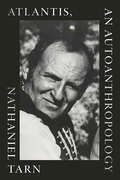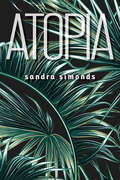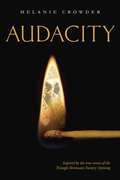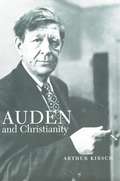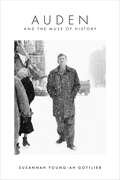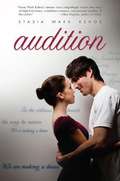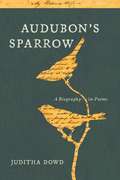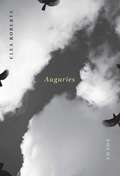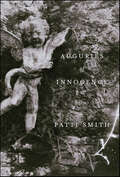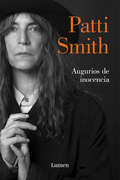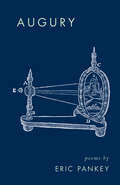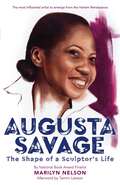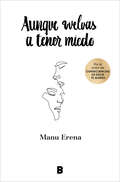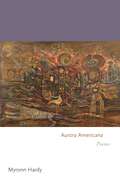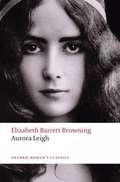- Table View
- List View
Asylum: A personal, historical, natural inquiry in 103 lyric sections
by Jill BialoskyThis book-length sequence by the critically acclaimed poet is a seeker's story, revealing personal and historical traumas and how we search for understanding and meaning in their wake.In Asylum, poet Jill Bialosky embarks on a Virgilian journey, building a narrative sequence from 103 elegant poems and prose sections that cohere in their intensity and their need to explore darkness and sustenance both. Taken together, these piercing pieces--about her nascent calling as a writer; her sister's suicide and its still unfolding aftermath; the horror unleashed by World War II; the life cycle of the monarch butterfly; and the woods where she seeks asylum--form a moving story, powerfully braiding despair, survival, and hope. Bialosky considers the oppositions that govern us: our reason and unreason, our need to preserve and destruct. "What are words when they meet the action of what they attempt to modify?" she asks, exploring the possible salve of language in the face of pain and grief. What Asylum delivers is a form of hard-won grace and an awareness of the cost of extreme violence, inexplicable loss, and the miraculous cycles of life, in work that carries Bialosky's art to a new level of urgency and achievement.
At Lake Scugog: Poems (Princeton Series of Contemporary Poets #58)
by Troy JollimoreThis is an eagerly awaited collection of new poems from the author of Tom Thomson in Purgatory, which won the National Book Critics Circle Award and was hailed by the New York Times as a "snappy, entertaining book." A triumphant follow-up to that acclaimed debut, At Lake Scugog demonstrates why the San Francisco Chronicle has called Troy Jollimore "a new and exciting voice in American poetry." Jollimore is a professional philosopher, and in witty and profound ways his formally playful poems dramatize philosophical subjects--especially the individual's relation to the larger world, and the permeable, constantly shifting border between "inner" and "outer." For instance, the speaker of "The Solipsist," suspecting that the entire world "lives inside of your skull," wonders "why / God would make ear and eye / to face outward, not in." And Tom Thomson--a character who also appeared in Jollimore’s first book--finds himself journeying like an astronaut through the far reaches of the space that fills his head, an experience that prompts him to ask that a doorbell be installed "on the inside," so that he can warn the world before "intruding on’t."______ From At Lake Scugog:LOBSTERS Troy Jollimore ? tend to cluster in prime numbers, sub-oceanic bundles of bug consciousnesssubmerged in waking slumber, plunged in pitsof murk-black water. They have coalesced out of the pitch and grime and salt suspendedwithin that atmospheric gloom. Their skinis colorless below. But when exposedto air, they start to radiate bright green, then, soon, a siren red that wails: I’m dead.The meat inside, though, is as white as teeth,or the hard-boiled egg that comes to mindwhen one cracks that crisp shell and digs beneath. Caress the toothy claw-edge of its pincerand you will know the single, simple thoughtthat populates its mind. The lobster trap is eleganceitself: one moving part: the thing that’s caught.
At Times: New and Selected Poems
by Brooke HorvathOver thirty years of poems from an American poet in the spirit of Alan Dugan and Nelson Algren's Chicago: City on the Make."At times . . . I wanted to be a poet." A fittingly sly and humble epigraph for this half- a- lifetime's worth of sly and humble, and also lyrical and joyous, poems. From the first poem in the collection, "The Woman in the Peter Pan Collar," in which the poet examines an old photograph of his mother, searching for clues, to the last, "Rainouts," in which he beseeches the Lord to let his own death take place on the sort of day that strands baseball games mid-inning, leaving "all final decisions happily deferred," Brooke Horvath is always intimate, never rhetorical or bland. This is poetry not just for the sake of poetry, but poetry as a way of life, of engaging with the world. Like the works of Alan Dugan or Galway Kinnell, these are poems of the everyday and, when read slantwise, of what lies beyond. The whole collection, in fact, is imbued with the wily double meaning of the final couplet from "What in the World Were We Thinking Of?"--"It was a day when nothing happened / that we will find worth remembering."
At War Within Myself
by Peter Phillips“If you are not into poetry, this book may change your mind. Like many people, I was put off poetry at school – over 50 years ago now – by a teacher who threatened (and carried out) ‘the slipper’ to any boy who could not recite his favourite poem off by heart. Having gone through life never realising or understanding the sweet nuances of poetry, I missed out on a whole raft of literature. It took my terminal illness to make me understand that, through poetry, one can have the imagination stirred to such a degree, that your whole view on life can be change in an instant. Climate change, poverty, homelessness. Illness, and now pandemic, are all part of life today. Also, to have a Faith can change one’s attitude to life. The poems in this book highlight the cruelty and compassion of life, the wonder of creation. If we don’t do something pretty quickly, we will lose it… But also to laugh at life can be a great tonic. To put faith and trust in a ‘Higher Power’ will help get us all through it.” Peter Phillips
At the Bureau of Divine Music: At The Bureau Of Divine Music
by Michael HeffernanA thoughtful and elegant collection from accomplished poet Michael Heffernan.
At the End of the World There Is a Pond: Poems
by Steven DuongA stunning debut volume infused with apocalyptic overload, beginnings and endings, and all the ways we betray ourselves. At the End of the World There Is a Pond is a book about aftermaths. Each poem comes in the wake of a deep rupture—the ruptures of mental illness and addiction, of migration and displacement, of violence, familial conflict, and ecological catastrophe—and yet the speakers engage with despair and playfulness in equal measure, always allowing humor, irony, and the exuberance of contemporary life to bend darkness toward something like hope. Again and again, Steven Duong’s writing excavates the unnatural conditions of a seemingly natural world, asking us to pay studied attention to its inhabitants. His poems force us to keep looking: at the betta fish trapped in its mason jar, the forest choked by invasive kudzu, the elephant wounded in a landmine blast. Through its relentless scrutiny and exacting care, this magisterial debut collection poses an impossible question: How can we reconcile a deep love for the world, in all its buzzing, wriggling aliveness, with an equally deep, self-destructive desire to leave it behind?
At the Foundling Hospital: Poems
by Robert Pinsky“Since the death of Robert Lowell in 1977, no single figure has dominated American poetry the way that Lowell, or before him Eliot, once did . . . But among the many writers who have come of age in our fin de siècle, none have succeeded more completely as poet, critic, and translator than Robert Pinsky.” —James Longenbach, The NationWith all the generosity and mastery we have come to expect from out three-time Poet Laureate, Robert Pinsky has written a bold, lyrical meditation on identity and culture as hybrid and fluid, violent as well as creative: the enigmatic, maybe universal, condition of the foundling. At the Foundling Hospital considers the foundling soul: its need to be adopted, and its need to be adaptive. These poems reimagine identity on the scale of one life or of human history: from “the emanation of a dead star still alive” to the “pinhole iris of your mortal eye.” What is a particular person? How unique? What is anyone born as? Born with? Born into? The poems of Robert Pinsky’s At the Foundling Hospital engage personality and culture as improvised from loss: a creative effort so pervasive it can be invisible.
At the Louvre: Poems by 100 Contemporary World Poets
by Antoine CaroNew poems from 100 of the world&’s brightest contemporary poets, all about a common subject: the Louvre—exploring the many pleasures, provocations, and surprises that the museum and its collection inspire.Of the world's great museums, the Louvre is the most encompassing, a sumptuous collection that includes not only some of the most celebrated works of art of all time, but fascinating, perplexing, splendid, and beautiful objects of all kinds, all housed in a building, itself monumental, that was once the seat of the kings of France. In the grand corridors and multiplying backrooms of the Louvre, the history of the world and the history of art and the history of how we look and think about art and its place in our lives challenge and delight us at every corner. Few other public spaces are at once so haunted and so alive.A unique collaboration between New York Review Books and the Louvre Museum, At the Louvre presents a hundred poems, newly commissioned exclusively for this volume, by a hundred of the world's most vibrant poets. They write about works from the museum's collection. They write about the museum and its history. They write what they see and feel, and together they take us on a tour of the museum and its galleries like no other, one that is an irresistible feast for the ear and mind and eye.Some of the poets in At the Louvre: Simon Armitage; Barbara Chase-Riboud; Hélène Dorion; Jon Fosse; Fanny Howe; Kenneth Goldsmith; Lisette Lombé; Tedi López Mills; Precious Okoyomon; Charles Pennequin; Blandine Rinkel; Yomi Şode; Krisztina Tóth; Jan Wagner; Elizabeth Willis.
At the Mermaid Inn
by Duncan Campbell Scott Douglas Lochhead Archibald Lampman Barrie Davies Wilfred CampbellThe original At the Mermaid Inn, one of the most notable literary endeavours in Canada, was the result of the combined efforts of three poets: Wilfred Campbell (1858-1918), Archibald Lampman (1861-99), and Duncan Campbell Scott (1862-1947).A Saturday column that ran in the Toronto Globe from 6 February 1892 until 1 July 1893, it covered a wide range of material – original poetry and prose, book and music reviews, articles on philosophy, politics, poetics, religion, and writings on a myriad of other matters. Critics have often referred to the column in general terms, but until now it has been unavailable in book form for detailed study. This careful transcription of the entire series offers a fresh perspective on three of the most important Canadian literary figures of the nineteenth and early twentieth centuries.Here are three major Canadian poets as prose writers. Lampman writes essays about nature and poetry; Campbell provides controversial views on many subjects, especially religion and poetry; Scott writes book reviews and scholarly essays on music and a variety of Canadian matters. At the Mermaid Inn gives a fascinating glimpse into the literary and social concerns of the day. This volume beings to new light one of the most readable and vital documents in Canadian life and literature.
Ateos que creen en Dios
by Andrés MonteroTodas las madres ateas son creyentes en Dios. Cualquiera que ame tiene fe. Ateos que Creen en Dios es una abstracción expresionista del concepto de Dios en forma de metáfora poética. <P><P>Ese concepto, la idea de Dios y principalmente de su naturaleza, representan el mayor reto intelectual y sentimental de la historia del ser humano.No hay nada comparable a la idea de Dios en cuanto a exigencia de esfuerzo mental, de capacidad de entendimiento y de imaginación. <P>Todos quienes profesan fe, con independencia del culto religioso al que se adscriban, buscan el discernimiento de Dios. En ese esfuerzo, la poesía se revela como vehículo estético y semántico para acercarnos a la comprensión de Dios. <P>Los poemas de esta obra formulan que el amor y la fe son equivalentes, mientras que ateísmo y confesión religiosa representan dos modos antagónicos de intelectualizar sentimentalmente a Dios.
Atlantis, an Autoanthropology
by Nathaniel TarnOver the course of his long career, Nathaniel Tarn has been a poet, anthropologist, and book editor, while his travels have taken him into every continent. Born in France, raised in England, and earning a Ph.D. from the University of Chicago, he knew André Breton, Salvador Dalí, Marcel Duchamp, Margot Fonteyn, Charles Olson, Claude Lévi-Strauss, and many more of the twentieth century’s major artists and intellectuals. In Atlantis, an Autoanthropology he writes that he has "never (yet) been able to experience the sensation of being only one person.” Throughout this literary memoir and autoethnography, Tarn captures this multiplicity and reaches for the uncertainties of a life lived in a dizzying array of times, cultures, and environments. Drawing on his practice as an anthropologist, he takes himself as a subject of study, examining the shape of a life devoted to the study of the whole of human culture. Atlantis, an Autoanthropology prompts us to consider our own multiple selves and the mysteries contained within.
Atopia (Wesleyan Poetry Series)
by Sandra SimondsAtopia grapples with the political climate of the United States manifested through our everyday lives. Sandra Simonds charts the formations and deformations of the social and political through the observations of the poem's speakers, interspersed with the language of social media, news reports, political speech, and the dialogue of friends, children, strangers, and politicians. The Los Angeles Review of Books characterized Simonds's work as "robust, energetic, fanciful, even baroque" and "a necessary counterforce to the structures of gender, power, and labor that impinge upon contemporary life." These poems reflect on what it means to be human, what it means to build communities within a political structure it also opposes.
Audacity
by Melanie CrowderThe inspiring story of Clara Lemlich, whose fight for equal rights led to the largest strike by women in American history A gorgeously told novel in verse written with intimacy and power, Audacity is inspired by the real-life story of Clara Lemlich, a spirited young woman who emigrated from Russia to New York at the turn of the twentieth century and fought tenaciously for equal rights. Bucking the norms of both her traditional Jewish family and societal conventions, Clara refuses to accept substandard working conditions in the factories on Manhattan's Lower East Side. For years, Clara devotes herself to the labor fight, speaking up for those who suffer in silence. In time, Clara convinces the women in the factories to strike, organize, and unionize, culminating in the famous Uprising of the 20,000.Powerful, breathtaking, and inspiring, Audacity is the story of a remarkable young woman, whose passion and selfless devotion to her cause changed the world. Praise for AUDACITY: * "Crowder breathes life into a world long past....Compelling, powerful and unforgettable." --Kirkus Reviews, starred review * "This book stands alone....an impactful addition to any historical fiction collection."--School Library Journal, starred review* "With a thorough historical note, glossary of terms, and bibliography, this will make an excellent complement to units on women's rights and the labor movement, but it will also satisfy readers in search of a well-told tale of a fierce heroine."--BCCB, starred review* "This is an excellent title that can open discussions in U.S. history and economics courses about women's rights, labor unions, and the immigrant experience."--School Library Connection, starred review "Based on the true story of Clara Lemlich, Audacity throbs with the emotions of this exceptional young woman who fought for equal rights and improved labor standards in factories. Melanie Crowder's verses spit out Clara's rage, cradle her longing and soar like the birds that are her constant companions."--Bookpage "Crowder's (Parched) use of free verse in this fictionalization of Russian-Jewish immigrant Clara Lemlich's life brings a spare poignancy to a familiar history."--Publishers Weekly "Audacity is an evocative reimagining of a fascinating historical figure who should be remembered for her determination in the face of great odds and powerful opposition--and for her role in changing America. Melanie Crowder's powerful verse reveals a long-past world, but the combination of hope and outrage that Clara Lemlich brought to her struggle should be both recognizable and inspirational to teen readers longing to right the injustices of our day."--Margaret Peterson Haddix, critically acclaimed, bestselling author of UprisingFrom the Hardcover edition.
Auden and Christianity
by Arthur KirschOne of the twentieth century's most important poets, W. H. Auden stands as an eloquent example of an individual within whom thought and faith not only coexist but indeed nourish each other. This book is the first to explore in detail how Auden's religious faith helped him to come to terms with himself as an artist and as a man, despite his early disinterest in religion and his homosexuality. Auden and Christianity shows also how Auden's Anglican faith informs, and is often the explicit subject of, his poetry and prose. Arthur Kirsch, a leading Auden scholar, discusses the poet's boyhood religious experience and the works he wrote before emigrating to the United States as well as his formal return to the Anglican Communion at the beginning of World War II. Kirsch then focuses on Auden's criticism and on neglected and underestimated works of the poet's later years. Through insightful readings of Auden's writings and biography, Kirsch documents that Auden's faith and his religious doubt were the matrix of his work and life.
Auden and the Muse of History
by Susannah Young-ah GottliebConcentrating on W. H. Auden's work from the late 1930s, when he seeks to understand the poet's responsibility in the face of a triumphant fascism, to the late 1950s, when he discerns an irreconcilable "divorce" between poetry and history in light of industrialized murder, this startling new study reveals the intensity of the poet's struggles with the meanings of history. Through meticulous readings, significant archival findings, and critical reflection, Susannah Young-ah Gottlieb presents a new image and understanding of Auden's achievement and reveals how his version of modernism illuminates urgent contemporary issues and theoretical paradigms: from the meaning of marriage equality to the persistence of fascism; from critical theory to psychoanalysis; from precarity to postcolonial studies. "The muse does not like being forced to choose between Agit-prop and Mallarmé," Auden writes with characteristic lucidity, and this study elucidates the probity, humor, and technical skill with which his responses to historical reality in the mid-twentieth century illuminate our world today.
Audition
by Kehoe Stasia WardWhen high school junior Sara wins a coveted scholarship to study ballet, she must sacrifice everything for her new life as a professional dancer-in-training. Living in a strange city with a host family, she's deeply lonely-until she falls into the arms of Remington, a choreographer in his early twenties. At first, she loves being Rem's muse, but as she discovers a surprising passion for writing, she begins to question whether she's chosen the right path. Is Rem using her, or is it the other way around? And is dancing still her dream, or does she need something more? This debut novel in verse is as intense and romantic as it is eloquent. .
Audubon's Sparrow
by Juditha DowdThe life of Lucy Bakewell Audubon, wife of the painter John James Audubon, comes to life through a series of poems, letters, and journal entries. The story begins when Lucy meets Audubon, the debonair French painter and dancing-master, and follows her until the publication of Audubon's iconic Birds of America. In their gentle simplicity, the poems portray Lucy as a devoted wife, a talented teacher, and a resilient woman who managed to survive the stresses of marriage to a brilliant but impractical husband.
Auguries
by Clea RobertsWhether speaking of erotic love, domestic life, spiritual wilderness, or family entanglements, the poems of Auguries, the much-anticipated second collection from Yukon poet Clea Roberts, are saturated with their northern landscape. Roberts is well versed in the distances and dynamics between tedium and ecstasy, light and dark, isolation and solitude, freeze and thaw, flow and stillness. Her poems are spare and clean, each like a single larch in an immense white plain; their exactness startling and arresting. As the Gerald Lampert Award jury citation for her celebrated first book noted, “Her images . . . are not only crisp and precise, but manage to speak about the physical conditions of this place and its emotional landscape in one and the same lyrical breath . . .” Written during a period in which Roberts both became a parent and lost a parent, the poems in Auguries lend themselves to prayer, surrender, celebration, reconciliation, meditation, and auspice. Tell me how to breathe between the painful and the beautiful, my lips, my eyelids slow with cold. (from “Cold Snap”) “Clea Roberts writes poems of clear, quiet beauty. They contain the silence of perception: alive to the world with open eye and open heart.” — Anne Michaels
Auguries of Innocence: Poems
by Patti SmithAuguries of Innocence is the first book of poetry from Patti Smith in more than a decade. It marks a major accomplishment from a poet and performer who has inscribed her vision of our world in powerful anthems, ballads, and lyrics. In this intimate and searing collection of poems, Smith joins in that great tradition of troubadours, journeymen, wordsmiths, and artists who respond to the world around them in fresh and original language. Her influences are eclectic and striking: Blake, Rimbaud, Picasso, Arbus, and Johnny Appleseed. Smith is an American original; her poems are oracles for our times.
Augurios de inocencia
by Patti SmithLa esencia de Patti Smith, su ADN. «Una joya escondida. Entre las mejores de ellas.»Library Journal «Rompimos el corazón de nuestra madre y nos convertimos en lo que somos.» La artista que ha inscrito su visión de nuestro mundo en poderosos himnos, baladas y letras desvela en esta deliciosa colección de poemas su universo más íntimo: el vínculo con la naturaleza y el paisaje, su mapa interior, las contradicciones del individuo, su meditación sobre la muerte y con la fe. Un monólogo interior fresco y original impregnado de influencias eclécticas como las de Rimbaud, Picasso, Arbus, o William Blake, cuya poesía la acompañó desde que, a la edad de ocho años, su madre le regaló un ejemplar de Canciones de inocencia y de experiencia. La gran creadora que confesó «Si tuviera que quedarme con una sola cosa sería la literatura» deslumbra con su poesía. La crítica ha dicho...«Un libro duro, magnético y bello. Un poemario revelación, como una visión o un manifiesto de esperanza, que lucha contra el horror, contempla la barbarie para luego acusar a sus culpables y exonera a los niños, los de ahora y los que llevamos dentro, que quizá hemos traicionado.»Ester Andorrà, El Nacional «En su primer poemario en varios años, Augurios de inocencia, presenta obras ligeras e inquietantes por su indagación espiritual, la imaginería original y las asociaciones insólitas. [...] Romántica y renegada, Smith pasa de la ira a la empatía y nos recuerda que puede haber sanación en la protesta, consuelo en el lenguaje, catarsis en la expresión. Como siempre, nos lleva a las profundidades más dolorosas y luego nos acerca bailando hacia la luz.»Donna Seaman, Booklist «Treinta años después de Horses la luz de Smith sigue brillando con fuerza.»San Francisco Chronicle «Una joya escondida. Entrelas mejores de ellas.»Library Journal
Augury: Poems
by Eric PankeyFrom award-winning poet and author of Crow-Work, a collection exploring the presence of the divine in the seemingly ordinary. The ancient Romans practiced augury, reading omens in bird&’s flight patterns. In the poems of Augury, revelation is found in nature&’s smallest details: a lizard&’s quick movements, a tree scarred by lighting, the white curve of a snail&’s shell. Here the sensory world and the imagined one collide in unexpected and wonderful ways, as Pankey scrutinizes the physical for meaning, and that meaning for truth. With uncommon grace, each of Pankey&’s precise lyrics advances our shared ontological questions and expresses our deepest contradictions. In a world of mystery, should we focus on finding meaning or creating it? How can the known—and the unknown— be captured in language?Augury is a masterful and magical collection from a poet of stirring intelligence, &“a book of stones unstitched from the wolf&’s belly.&”Praise for Augury &“A darkly luminous book by a poet at the height of his considerable poetic power.&” —Kathy Fagan, author of Moving & St. Rage &“This is a book I will keep close at hand, alongside the best work of Montale, Dickinson, Celan, and Stevens. This is a book one will turn to again and again.&” —Rebecca Dunham, author of Cold Pastoral &“Each ethereal image he weaves into his work is delicately curated, whittled down through his attention to sound. . . . Pankey&’s poems destabilize as they straddle time and place, and he looks askance at the narrow way in which language is often viewed.&” —Publishers Weekly
Augusta Savage: The Shape of a Sculptor's Life
by Marilyn NelsonA Claudia Lewis Award Winner for Poetry by the Bank Street College of Education A Black Caucus ALA Children & Young Adult Award Winner A CCBC Children&’s Choice • A CBC Teacher Favorite This powerful biography in poems tells the life of Augusta Savage, the trailblazing artist and pillar of the Harlem Renaissance. Augusta Savage was arguably the most influential American artist of the 1930s. A gifted sculptor, Savage was commissioned to create a portrait bust of W.E.B. Du Bois for the New York Public Library. She flourished during the Harlem Renaissance, and became a teacher to an entire generation of African American artists, including Jacob Lawrence, and would go on to be nationally recognized as one of the featured artists at the 1939 World&’s Fair. She was the first-ever recorded Black gallerist. After being denied an artists&’ fellowship abroad on the basis of race, Augusta Savage worked to advance equal rights in the arts. And yet popular history has forgotten her name. Deftly written and brimming with photographs of Savage&’s stunning sculpture, this is an important portrait of an exceptional artist who, despite the limitations she faced, was compelled to forge a life through art and creativity. Features an afterword by the curator of the Art & Artifacts Division of the Schomburg Center for Research in Black Culture. NAMED ONE OF THE BEST BOOKS OF THE YEAR BY Horn Book • Kirkus Reviews • School Library Journal • Bank Street College ★ "A stunning portrait of artistic genius and Black history in America." —Booklist, starred review ★ "A wonderful addition to young people&’s literature on African American artists." —Horn Book, starred review ★ "In a rich biography in verse, Nelson (A is for Oboe) gives voice to the Black sculptor Augusta Savage (1892-1962), a key Harlem Renaissance figure." —Publishers Weekly, starred review ★ "Nelson&’s arresting poetry, which is accompanied by photographs of Savage&’s work, dazzles as it experiments with form. … A lyrical biography from a master of the craft." —Kirkus Reviews, starred review ★ "A master poet breathes life and color into this portrait of a historically significant sculptor and her remarkable story." —School Library Journal, starred review
Aunque vuelvas a tener miedo
by Manu ErenaEl nuevo libro del fenómeno de la poesía en España: Manu Erena, el autor de Consecuencias de decir te quiero y Nos quedarán más atardeceres. Este libro está dedicado a aquellas personas que temen, aman y luchan día a día. A aquellos que siguen adelante a pesar del dolor. «Después de perderlo todoy de obligarnos a curarnuestras heridas más profundas,sanaremos cuando seamos capacesde hablar sobre todo lo que nos duele.Yo fui mi propio miedo hasta que me di cuentade que no quería un final así para mi historia,hasta que pude cambiarlo contigo.Porque, aunque vuelvas a tener miedo,el amor también es capaz de salvarnos,y decir adiós es otra forma de querer.» Tras el éxito arrollador de Consecuencias de decir te quiero y Nos quedarán más atardeceres y haber sido el autor de poesía más vendido antes de cumplir los dieciséis años, Manu Erena se consolida como la voz poética de toda una generación. Con la belleza y la sensibilidad que ha conquistado a sus miles de lectores, en este libro nos habla de todo lo que solemos callar, de los temores -esos que llegan en la adolescencia y no nos abandonan nunca- y de lo importante que es contar en la vida con personas que nos ayudan a plantar cara al miedo y son refugio para seguir adelante. La crítica ha dicho:«Sincera, sutil y desgarradora. La poesía de Manu Erena te hará sentir desde la primera página».Inma Rubiales «La pureza de las palabras de Manu Erena enamorarán tus recuerdos».Defreds «Manu Erena es la sorpresa editorial del año.»Zenda «Manu Erena, el poeta de 16 años que pulveriza las listas de ventas.»The Objective «Los versos de Manu Erena se han ganado el corazón de los lectores.»Woman
Aurora Americana: Poems (Princeton Series Of Contemporary Poets Ser. #174)
by Myronn HardyFrom an award-winning poet, an exciting new collection that explores exile and return, from North Africa to North AmericaIn Aurora Americana, Myronn Hardy, an American poet who moved back to the United States after living for years in Morocco, reflects on exile and return as he describes the experience of leaving North Africa and rediscovering a North America both recognizable and unrecognizable. What does it mean to feel exiled both away from and at “home”? What does it mean to miss something?In forms such as the sonnet, ghazal, and triolet, Aurora Americana takes up the distant and recent past of the United States, from Thomas Jefferson to the deadly “Unite the Right” march in Charlottesville, Virginia. But the book also meditates on smaller, momentary encounters across racial and national barriers, from evocations of Francophone Africa to a screening of Black Panther in Portugal for a mostly white audience. Allusions to Fannie Lou Hamer, Frantz Fanon, Prince, John Coltrane, Alessandro de’ Medici, Ahmed Zaki, Modesto Brocos y Gómez, Nasser Zefzafi, and others anchor the collection. With poems set at or near dawn, Aurora Americana explores an ominous yet hopeful new morning in America, one in which potential cataclysm exists alongside possibility and change.
Aurora Leigh
by Elizabeth Barrett Browning Kerry McsweeneyWidely regarded as Elizabeth Barrett Browning's (1806-1861) major work, Aurora Leigh is important both for its address to contemporary social issues, the "woman question" in particular, and for its experimentation with poetic form. The text of this edition is based upon meticulous examination of the extant manuscripts, corrected proofs, and revisions to the poem. It is accompanied by a full textual history of the poem's composition and publication; comprehensive annotation of literary allusions and contemporary references; and an essay on the significance of the verse-novel as an early example of politically self-conscious women's writing.
